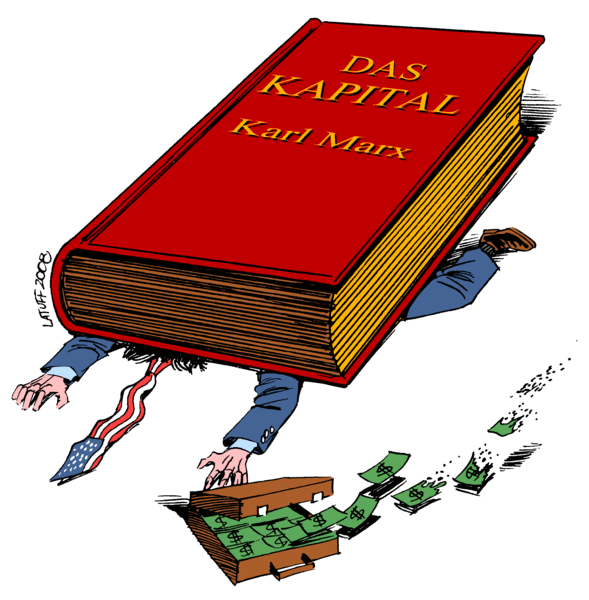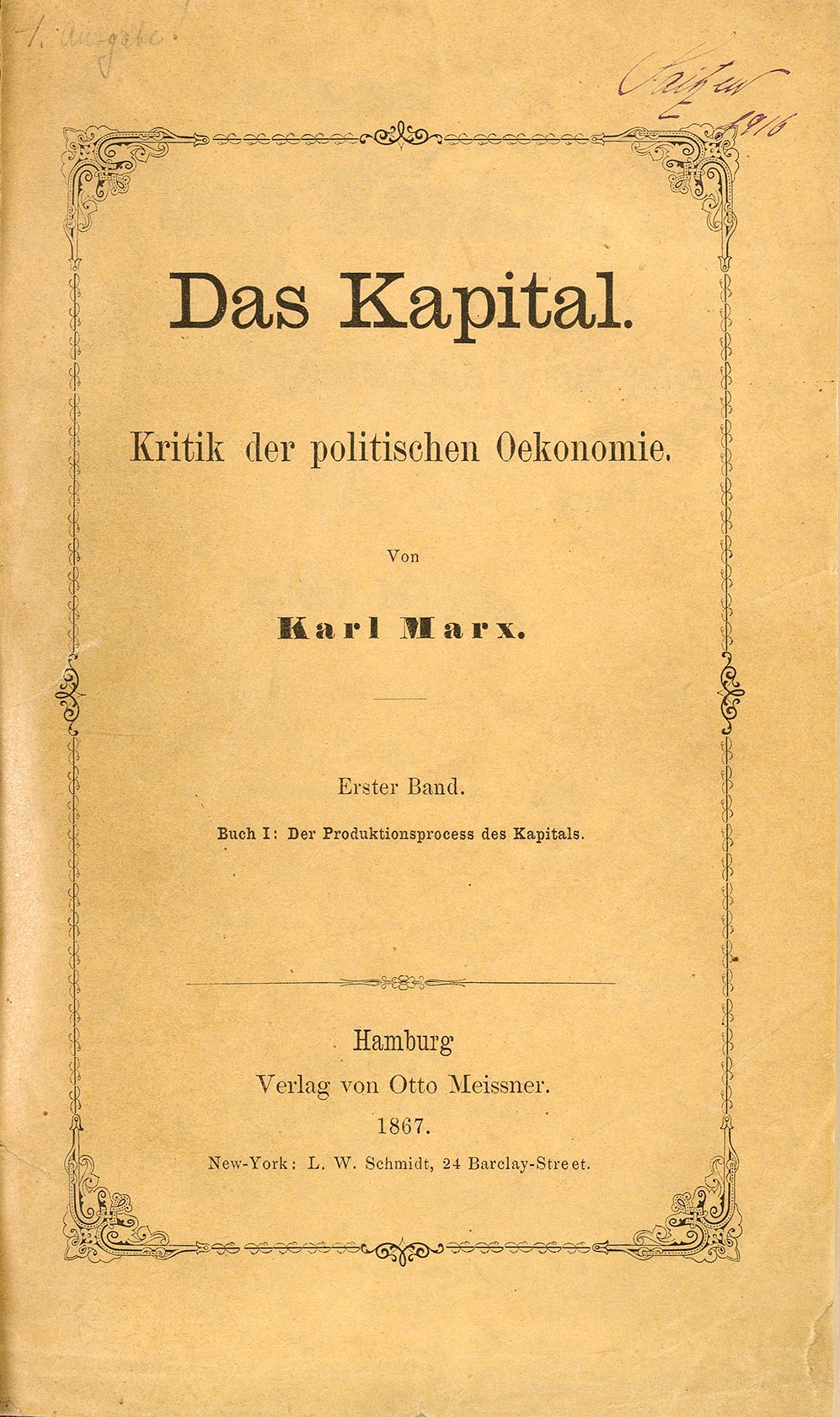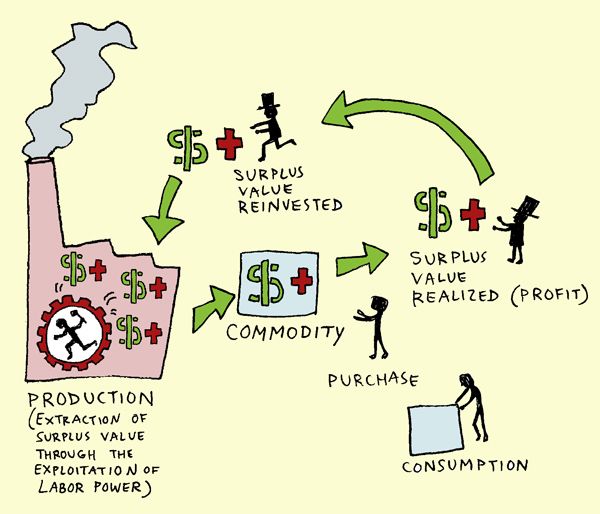Read "Anti-Dühring" [3]: Marxist Political Economy
Posted by Bruce Yu
foreword
The content of this article is an explanation of the second volume of "Anti-Dühring", "Political Economy".
I personally think that Engels' criticism of Dühring in the first volume is a criticism of Dühring's metaphysics, while the criticism of the second two volumes is a criticism of Dühring's socialist thought. In Part II, Engels used a series of tools to support his argument. These tools, of course, like Descartes' treasure chest, are imbued with the personal touch of Engels.
Summary of Part Two of the Anti-Dühring
In the first part, Objects and Methods, Engels mainly talked about political economy. The object of economics research is naturally the law of production and exchange; the method used for research is to study and compare the forms of production, exchange and distribution of various classes. Here Engels is mainly concerned with the economic model and production relations with class as the main division. Engels used his study of the capitalist mode of production to show that it is class contradictions that drive historical progress, not the distributional rights of a just or unjust economy as Dühring called it. Here Engels also criticized the economists' view of economics in the eighteenth century: scholars at that time generally believed that the forms of production, exchange and distribution among people were determined by some immutable nature . By comparing the social structure and mode of production in different periods, Engels concluded that the forms of production, exchange and distribution change with the change of productive forces. The analysis of the forms of production, exchange, and distribution, which Engels called the method used to study political economy, is the core of the second part. The content of the whole second part is developed around the analysis of these three forms.

After that, Engels criticized the theory of violence. Different from the materialist view of history advocated by Marx and Engels with class struggle as the core driving force of history, the utopian socialism at that time mainly regarded various metaphysical concepts as the core force driving history. What Engels is criticizing here is Dühring's idealistic view of history that regards violence as the original sin of history and the elimination of violence as the progress of history. Engels pointed out here: the use of violence to enslave others or occupy the ownership of other people's land is only a method of exploiting others in certain historical periods - such as slavery, feudalism; and in the capitalist period, capitalists generally do not The use of violence to exploit employees does not mean capitalist society has become a utopia. Engels mainly proceeded from three perspectives to demonstrate the absurdity of the theory of violence:
- The purpose of violence is economic, that is, to exploit the ruled class, not purely for violence or because of the so-called original sin;
- The advancement of the means of violence (weapons and the organization of the army) requires the advancement of productive forces and production relations, that is, the existence of tools supported by an economic base;
- The use of violence is not the reason for the emergence of the ruling class. On the contrary, the use of violence promotes the formation of more progressive production relations at certain points in time.
The reader can easily draw three conclusions from these three aspects:
- Violence is a tool of the ruling class ;
- Violence is a superstructure ;
- The use of violence has nothing to do with how advanced or backward a civilization is. Therefore, violence cannot be an element of historical development.
Here, Engels mainly uses these tools: the concept and analysis of class, his military knowledge, the history of bourgeois revolutions (such as the French Revolution), and anthropological studies. In the following pages, Engels will repeatedly use different philosophical tools to criticize the theory of violence.
value, capital
Engels criticized Dühring's definition of the value of various things in The Theory of Axiology. Here, the tool used by Engels is the object of the study of "Das Kapital" and the economics he mentioned earlier. Engels uses his economic object to illustrate : the production form and exchange form of a production relation will inevitably lead to a specific form of value distribution. The capitalist form of production and exchange necessarily leads to its form of distribution. There cannot be a system that preserves capitalism's so-called efficient forms of production but eliminates its unfair forms of distribution. Engels, on the other hand, cites the contents of Capital to explain and describe in detail the form of capitalist value distribution (the theory of surplus value), the form of production (the labor theory of value) and the form of exchange (the form of commodity circulation). Other concepts that appeared in Capital, such as means of production and consumption, were also used by Engels to point out omissions in Dühring's argument.

In Simple and Complicated Labor, Engels defended the labor theory of value. I think the most important thing here is the sentence "labor cannot have any value", which sums up the labor theory of value very well. The labor theory of value refers to the fact that labor produces value, not that labor itself is value. The first value here refers to the value of the product produced by labor through means of production ; while the second value refers to the commodity value of labor time itself sold as a means of production . Labor itself should not be a commodity, and the value created by labor depends on labor force and labor time, and has nothing to do with the commodity value of labor itself (worker's salary) . Later, Engels also mentioned why labor has commodity value in capitalist society. He stated that the foundation of the existence of capitalist forms of production and distribution is the existence of sufficient free means of production. This means of production refers to the free productive forces that can be purchased in the commodity market, in other words, the abundance of cheap labor in the talent market. This workforce must maintain several states:
- It must be sufficient and not out of stock (the unemployment rate must remain at a high level);
- It must be free and cannot have its own assets (without its own means of production, it cannot produce and sell commodities by itself, and cannot complete the cycle of capital by itself);
- It must be the means of production, the use value of which is greater than the value of the commodity, and the surplus labor that has been exploited can be transformed into the surplus value of the commodity.
Engels also criticized a simple egalitarian idea. He pointed out that the difference in labor force produced by the division of labor is objective, and a commune that eliminates the social division of labor and labor force cannot exist; deliberately eliminating the social division of labor and the distinction between simple labor and complex labor will only result in Regression of productivity and production relations. Engels gives an example here: the labor force of a professional cart worker (simple laborer) and a professional architect (complex laborer) are obviously different, and it is mandatory for an architect to push carts, cart workers Going to blueprints just creates confusion; paying architects and cart workers the same wages is clearly not desirable. Of course, Engels also proposed ways to limit the exploitation of simple labor by complex laborers. Engels pointed out that the private ownership of the means of production led to the private ownership of labor as a means of production, and the means of production required by the labor force were private, which in turn led to the high commodity value of complex labor in private ownership; while in a public ownership society, labor as a means of production was publicly owned. Yes, the means of production required for the production of labor force are jointly provided by the whole society, and the commodity value (that is, the salary) of complex labor force will decrease or even approach zero.
"Capital and Surplus Value" is more of an explanation and defense of "Das Kapital". Here, Engels mainly explained the concept of capital and surplus value. In the economic form carried out in the process of commodity circulation, money is the initial form of capital; and capital, in its own deformation and circulation, is first transformed from the form of money into means of production, then into commodities, and finally, commodities are sold, and then Convert to currency at a time. The value-added of money in the process of capital circulation, that is, the production form of capital, does not originate from money itself. The extra value that money generates in the capital cycle is called surplus value. Money itself does not produce money, and the transaction of commodities does not produce money, so the only correct answer comes from the means of production. The capitalist buys the means of production with money equivalent to the commodity value of the means of production, then transfers the use value of the means of production to the produced products, and then sells the products at the commodity value to get the money back. In this cycle, the difference between the commodity value and the use value of the means of production is converted into the commodity value of the product, which is then converted into excess money, that is, surplus value, in the process of commodity circulation. The means of production here can refer to dead things such as machines and land, of course, it refers more to free labor in the market. Here, Engels combined the two magic weapons of the capital circulation process and the labor theory of value to expose the trick of capital appreciation and surplus value.

Another point is the concept of historical stages of capital. Here Engels states that although surplus labor and exploitation of productive forces existed long ago, capital is the product of a particular historical stage. I think Engels' elaboration here can very well help contemporary people understand the concepts of class struggle and historical stages. Engels here emphasizes that surplus labor, the monopoly of the means of production, and the exploitation of labor caused by monopoly, are "the common denominator of all social formations which have so far moved in class antagonisms"; Labor is transformed into surplus value attached to commodities by the capitalist form of exchange. Only when labor power becomes a freely purchasable means of production in the capitalist form of production does the means of production take the form of capital and participate in capital itself. In the cycle, it is monopolized by capitalists according to the form of capitalist distribution. Obviously, this analysis method is still applicable today. Dividing classes and historical stages according to forms of exchange, production, and distribution is far more effective than simply applying definitions given by later generations, looking at so-called asset amounts and economic indicators, and investigating the political orientation of certain groups.
Criticism of Violence
At the same time, Engels criticized a concept that still has great influence today: "labor produces, violence distributes." Obviously, this stubborn violence theory has long been eliminated by the philosophical circle. The modern proletariat is not a Greek slave who can be whipped or even killed; neither is the capitalist and bourgeoisie a huge shadow government that controls everything. It is a pity that these concepts, which were repeatedly criticized by Engels, are still the truths and programs pursued by most of the "left-wing" people to this day. Engels raised three questions against the theory of violence, and these three questions also appeared vaguely in the previous "On Violence":
- How capital, as a whole, acquires violence;
- How this violence translates into capital growth and profit;
- Where does violence itself profit from.
Let us briefly expand on these three questions:
- If the ruling class uses violence to exploit the people, how does violence produce more progressive violence;
- If violence leads to the unfair distributional forms of capitalism, how violence transforms the production of laborers into an asset for the rulers;
- If violence guarantees the prosperity of the ruling class, how does violence produce these assets.
Clearly, the existence of violence theory does not help us to see how the ruling class exploits the people; on the contrary, this self-contradictory thinking only leads to more confusion. What's more, on the basis of violence theory, a strange concept has developed. After assuming the major premise of the distribution of violence, they believe that the distribution of capital appreciation by violence will make the ruling class unite; and this distribution of violence will form a stable social system. To put it simply, it is the market competitiveness caused by the pursuit of profit by capital in the free market that some economists talk about every day. However, this kind of talk of capital profit-seeking as a panacea is hollow. The so-called market competitiveness and violent distribution cannot explain Engels' three problems, let alone justify it.
Like my work? Don't forget to support and clap, let me know that you are with me on the road of creation. Keep this enthusiasm together!
